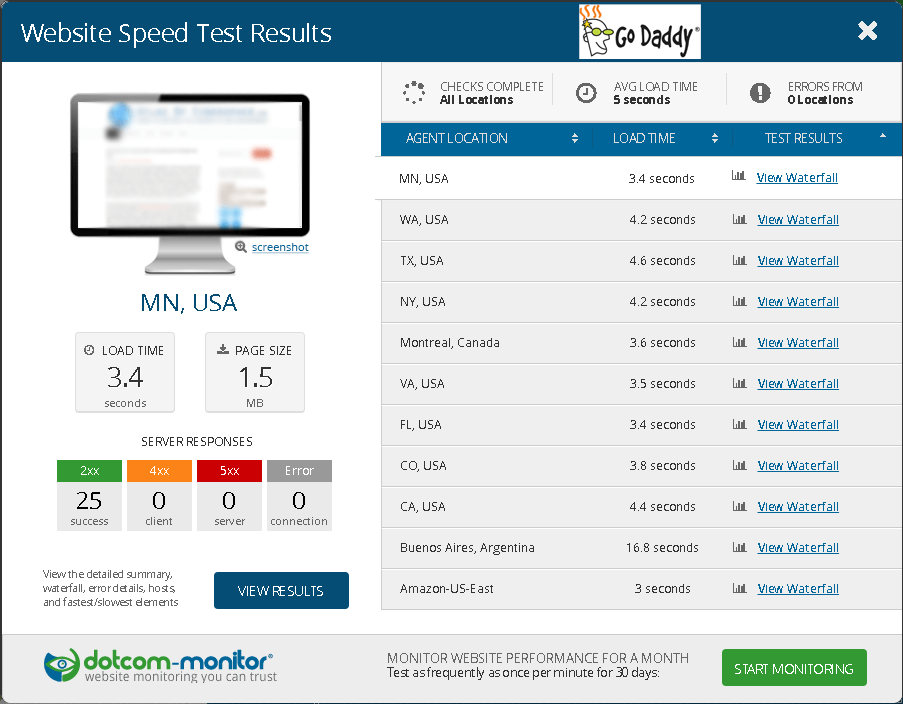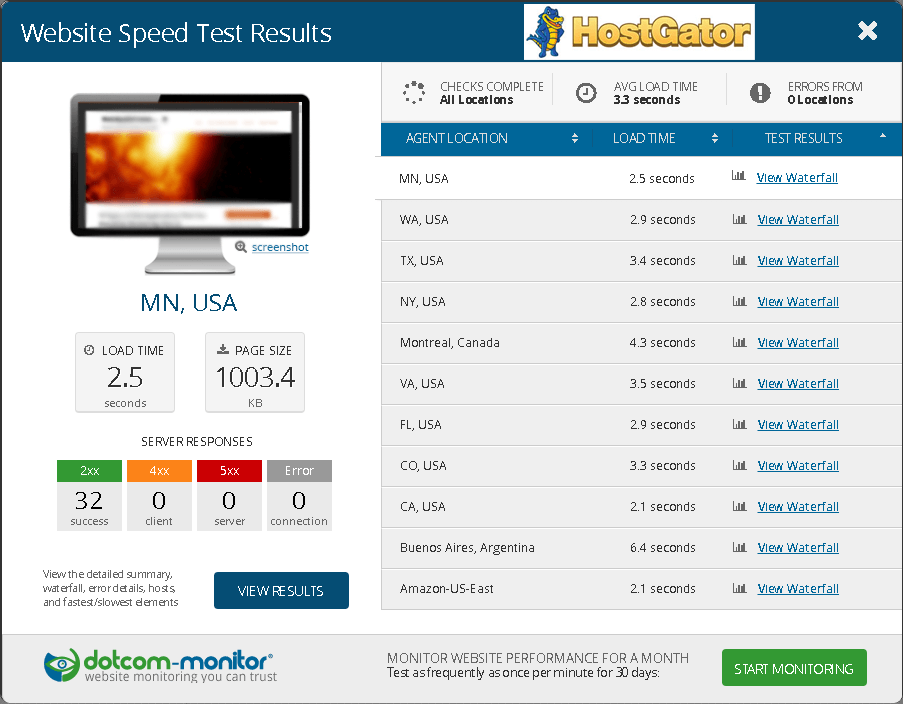HostGator vs GoDaddy—Who’s Right for You?

Last Updated:
Trying to find a good web host can be a difficult task—there are tons of companies to choose from, so it can be hard to know which one is the best choice. If you’ve landed on this particular page, you’re probably trying to decide between HostGator and GoDaddy.
While they’re both solid companies, they each offer different things that may be better for one person compared to another. GoDaddy is one of the biggest domain registrars on the web so they make it easy to roll everything into one package. HostGator is one of the largest hosting companies, so in our opinion they spend a little bit more time making sure that their hosting is up-to-par (although there are better shared hosting options like Hostinger).
To help you decide, we’ve put each host to the test for over a whole year and gathered metrics on uptime, speed, performance, and more. We’ve been building websites for over 15 years, and have used nearly every host out there, so you won’t find a more thorough comparison of HostGator vs GoDaddy anywhere on the web!
Complete disclosure: if you decide to buy hosting from any of the links below, we may get an affiliate commission payment from that host depending upon a variety of factors. We want you to know that this does not, in any way, affect our breakdowns or reviews. If we don’t like a host, we’ll definitely tell you (see this page for a list of hosts that we don’t recommend).
Let’s not waste any more time and jump right in to a comparison of GoDaddy vs HostGator and see who comes out on top!
GoDaddy vs HostGator: Evaluation Metrics
There are a lot of different factors that can be looked at when comparing a webhost, however, here’s what we typically like to focus on:
- Speed and Performance
- Reliability/Uptime
- Customer Service/Support
- User-Friendliness
- Pricing and Features
In our opinion, these factors paint the best and most complete picture of whether or not one webhost is better than another for a particular situation or setup. They also help to separate low quality web hosts from high quality web hosts.
Speed and Performance: How GoDaddy and HostGator Stack Up
Most people know that in terms of web hosting, speed is one of the most important metrics. If a website loads slowly, it’s going to frustrate visitors and they may not return. In terms of being found in search engines, speed matters and is a factor when it comes to one site being listed above another. All in all, speed is a very important factor to say the least.
When speaking about shared hosting, there are a lot of different factors that influence server speed. One of the biggest factors is how well a particular host manages their resources on a shared server. Some hosts let bad actors hog bandwidth which slows down the server for everyone, while other hosts are pretty vigilant about throttling people who use excessive resources.
In order to compare HostGator vs GoDaddy in the speed department, we conducted a site speed test with Dotcom-Tools.com. This tool is nice because it allows you to test from global locations around the world and uses a non-cached DNS in order to get a true “first visit” result. While they offer global testing locations, we used the American network for this test. If you take a look at the images below, you can see the results of the test:

If you look closely at the performance charts, you can see that the site hosted on GoDaddy had a best load time of 3.4 seconds from the Florida datacenter. The test site hosted on HostGator (below) has a best page loading time of 2.1 seconds from the California datacenter.

The worst load time for the GoDaddy site was a whopping 16.8 seconds from the Argentina datacenter, while the worst load time for the HostGator site was 6.4 seconds from the Argentina datacenter—considerably less than the time it took for the GoDaddy site to load. The average load time for the GoDaddy site was 5 seconds while the average load time for the HostGator site was 3.3 seconds. While these aren’t the exact same site, they are both WordPress sites with identical plugins, very similar content, and a very similar design; so for all intents and purposes, they may as well be the same.
Who won in the speed and server performance category? HostGator—by a pretty large margin.
This doesn’t mean that GoDaddy is a bad web host, but we’ve personally had better luck with HostGator being faster and from our experience they seem to manage the resources on their servers (especially their shared hosting) much better. We don’t know if GoDaddy does a poorer job at this because they are a domain company first, or for another reason, but HostGator definitely gets the win in this category.
HostGator Compared to GoDaddy – Uptime/Downtime
Uptime is another very important metric when it comes to determining the quality of a web host. Generally speaking, uptime a metric that measures how long a website is online versus how long it’s down. For example, if a website were down 1 day out of 30 days in a month, the uptime would be 1/30, or 96.6% for the month. Most web hosts do a lot better than that and guarantee uptime of 99% or more, some even 99.9%.

When it comes to HostGator vs GoDaddy, they each have guarantees for their shared hosting in terms of uptime. HostGator guarantees 99.9% uptime which is excellent. GoDaddy also offers an uptime guarantee of 99.9% for any given month. If they fail to meet that, they’ll refund a customer 5% of the hosting costs, which isn’t all that great to be honest. In contrast, HostGator will actually issue an entire month credit in the event that they fall short of the 99.9% uptime rating, which is much better than 5%–so in the area of the uptime guarantee, HostGator wins big.
But what about actual uptime? In order to test this, each site was monitored for a period of 12 months using Dotcom-Monitor’s ServerView monitoring platform. Each site was tested every 3 hours for 12 months straight to determine their level of uptime.
As mentioned in the BlueHost vs HostGator page, the HostGator test site had an astonishing 100% uptime rate in the last 12 months—which is exceptional! This doesn’t mean that there wasn’t downtime as the monitoring interval was every 3 hours, but it does mean that no downtime was detected, so it there was any downtime, it didn’t last for more than 3 hours (the time in between checks).

The GoDaddy test site had an uptime percentage of 98.5% over the course of 12 months, which is still very good but not as good as the HostGator site and that number falls below GoDaddy’s Server Level Agreement (SLA) number of 99.9%. Granted, their SLA only encompasses a one month period, but it’s still notable that their 12 month average was below their monthly SLA.
The clear winner for uptime/downtime: HostGator, who managed to pull of 100% uptime over the course of 12 months.
This doesn’t mean that GoDaddy offers unreliable hosting, but in our experience, these numbers translate well to real life as we’ve personally had trouble with GoDaddy hosting being to slow or down and have not had nearly the same amount of trouble with HostGator.
Service & Support – HostGator vs GoDaddy
With respect to customer service and technical or other support, this is an area that is certainly subjective. Experiences can certainly differ quite a bit among different people with the same company. So how do you know which is true? Honestly, both experiences could be true and it’s hard to know whether one company has better support than the other, and what factors might be involved in making that determination.
From our personal experience, GoDaddy has had excellent customer support. They offer US-based telephone support which a lot of other companies do not offer. However, we’d really found their chat support to be lacking when we’ve had to use it. The responses seem to be quite slow, and the first-level technicians don’t seem to be all that knowledgeable with respect to technical issues. Their domain support, however, is awesome—but we’re talking about web hosting support here.

When it comes to HostGator, we think their support used to be quite a bit better. The wait times (from our experience) have been ridiculous (over 30 minutes sometimes) and their chat window frequently hangs. We’ve had tickets go unanswered for over a week and it’s unfortunate to see that happen with HostGator because their support used to be top notch.
We still really like HostGator as a hosting company and can honestly recommend them, so we really hope that they get their customer service problems sorted out. Working with GoDaddy for hosting support just feels like you’re being farmed out somewhere and you’re more or less just a number to a big company.
Who wins for support? It’s a tie, at this point. We think that both companies could do a little bitter in terms of improving their support. If HostGator can bring their support levels back to what they were 5-6 years ago, we really think they’ll pull ahead of GoDaddy. However, if GoDaddy can get their hosting support on the level of their domain support, they may be the winner.
User-Friendliness: GoDaddy and HostGator
When it comes to ease of use, it’s an important consideration if you aren’t a person who is super tech savvy. If you are, then you probably aren’t all that concerned with how easy (of difficult) it may be to deploy a web server.
This is another fairly subjective area because what one person think is user-friendly might not feel the same to another person. It’s also important for a hosting interface to “make sense” as not all hosting companies have interfaces that are easy to navigate (we’re looking at you, DreamHost).

cPanel is essentially the most popular control panel in the shared hosting world, and both HostGator and GoDaddy use it. Each host also offers a variety of WordPress hosting plans, VPS hosting plans, and everything in between.
Although this is our opinion, when it comes to ease of use, we have to give the nod to GoDaddy in terms of being the most “noob-friendly” mainly because if you purchase hosting from them and have a domain with them as well, they make it quite seamless to setup the hosting. GoDaddy also caters to small businesses, entrepreneurs, and other people who might have a new idea and want to register a domain name and get a website live with little to no experience.
HostGator isn’t difficult to use, but in our opinion, you do need to know your way around a hosting panel in order for it to make sense to you. Yes, both hosts do use cPanel but GoDaddy does a better job of using a custom version that is a little more friendly to people who haven’t setup their own websites before.
Who wins in the area of user-friendliness? GoDaddy. They make it very easy to host a domain that’s registered with them and get a website live with little to no experience.
However, if you have some experience with hosting and using cPanel, we’d recommend HostGator as we think they’re shared hosting is a bit faster and more reliable.
Pricing/Features—HostGator Compared to GoDaddy
Pricing for web hosting is one of the most confusing things on earth—mainly because there are so many different coupons and the renewal rates can vary significantly. Generally speaking, most web hosts will charge an introductory rate and then raise that rate upon renewal.
On top of rates going up at the end of a specific term, most hosts will also offer discounts to those who pay further in advance. For example, HostGator’s “Hatchling” plan (their smallest shared hosting plan available) is $12.95/month when paid monthly, and $3.75/month when paid for 36 months—so you can see the value in signing up for a longer term with a web host.
HostGator’s cheapest plan offers unlimited bandwidth, unlimited storage, and unlimited email addresses, while GoDaddy’s single site shared hosting plan offers unlimited bandwidth, but only 100GB of storage and 100 email addresses. This makes HostGator the clear winner in terms of value, as GoDaddy’s cheapest plan is $5.95/month when paid for 36 months at a time.
Which host offers the best value? HostGator, for sure. It’s really hard to beat their Hatchling plan in terms of shared hosting performance, reliability and especially pricing when it comes to a per-dollar value.
HostGator vs GoDaddy: And The Winner Is…
Hostgator, hands down. Not only does HostGator offer a better value per dollar, but they are also more reliable (better uptime rating) and faster (better speed test rating).
This doesn’t mean that GoDaddy is a bad web host per se, but in our experience HostGator is better in almost every way except for user-friendliness, which doesn’t matter all that much once you get used to working with cPanel and web servers. If you plan on running your own website, it would be good to get acclimated with the basic functions of web servers and hosting. Once you do that, any small advantage (in our opinion) that GoDaddy has over HostGator dissipates and HostGator is the clear winner.


